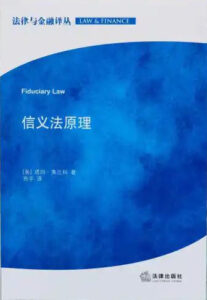Fiduciary Law Now Available in Chinese

Tamar Frankel, Professor of Law Emerita, Boston University School of Law, Boston, MA and Xiao Yu, Professor East China University of Political Science and Law, Shanghai, China
In my opinion, Professor Frankel‘s argument in this book has characteristics of bold hypothesis and careful verification. Combining seemingly different kinds of legal relationships with a generic concept is a pioneering work that expands the types of legal relationships. However, due to the breakthrough in tradition, it is bound to bring a lot of controversy. Throughout the book, Professor Frankel is careful to point out the controversies surrounding this view as she builds new ones. Professor Frankel‘s writing is logical and clear. She not only captures the commonality of things and the essence of problems with sharp and thorough language, but also expresses easily, without being obscure or difficult. In the process of argumentative reasoning, there are always appropriate cases to support, which makes reading clear and cordial. I can feel that a wise and erudite female professor is explaining the construction and practice of theory. The thoughts in the book shine with the idealistic light of the judicial construction of the trust concept of “being trusted by others and loyal to people.”
The application of fiduciary duty in China has experienced a gradual development process. The Company Law has the principal provisions on the duty of loyalty and duty of diligence of directors. With the development of the asset management industry, a consensus has been reached in both theoretical and practical circles that trustees and fund managers of asset management have fiduciary duties to investors. However, how to apply the fiduciary duty derived from the Common Law system under the Civil Law system of our country has always been a difficult point in theory and practice. Fiduciary duty is the boundary of lawful behavior and business risk; the market wants to sum up the code of conduct as the guide of behavior. Judges look for clear discretion standards to divide the responsibilities between the parties. The Supreme People’s Court, Asset Management Association of China, Shenzhen Intermediate People’s Court and Shanghai Financial Court have all set up special projects to study the scope and application of fiduciary duties of private fund managers. Although Professor Frankel‘s book is not specifically aimed at the field of asset management, the principles and concepts summarized and distilled can provide guidance for the analysis of specific problems. This is the purpose of Professor Frankel‘s distillation of the universality theory in this book. The book provides guidelines for the behavior of asset trustees and fund managers with clear obligations and responsibilities, and provides reference standards.

Chinese Edition, Fiduciary Law
Tamar Frankel
(2020 Law Press)
